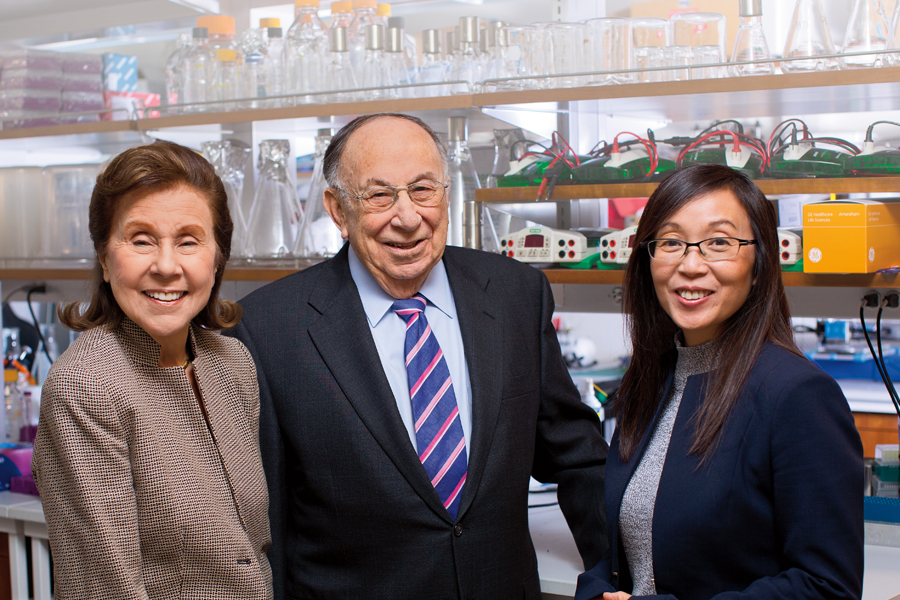
A leading neuroscientist whose research has advanced the understanding of Alzheimer’s disease and related neurodegenerative disorders, Dr. Gan joined Weill Cornell Medicine in July and was recruited as the Burton P. and Judith B. Resnick Distinguished Professor in Neurodegenerative Diseases. She previously served as associate director of the Gladstone Institute of Neurological Disease at the University of California, San Francisco.
“We are thrilled that Dr. Gan is leading the Appel Institute into a new era of discovery in the fight against this debilitating and fatal disease,’’ says Overseer Vice Chair Robert Appel, who, together with his wife, Helen, recently made a gift of $5 million to bring Dr. Gan to Weill Cornell Medicine.
The Helen and Robert Appel Alzheimer’s Disease Research Institute was established in 2006 with a $15 million gift from the Appels. In 2009, Mr. and Mrs. Appel made a second gift of $15 million in support of the Institute.
The rising prevalence of Alzheimer’s disease – and its severe impact on patients and families – has made the condition a research priority for Dr. Gan. By the year 2050, there will be 14 million people in the United States with Alzheimer’s disease, at a total healthcare cost of $1 trillion, she says.
“It’s hard to find anyone who hasn’t felt the impact of Alzheimer’s disease in one way or another,’’ says
Mr. Appel. “Two of our very close friends passed away as a result of the disease, and we were devastated by their suffering. It is our sincere hope that this Institute continues to provide the resources necessary to increase understanding of the disease and one day find a cure.”
“I am so thankful to Helen and Bob Appel for their profound generosity in supporting the important work being done in Alzheimer’s research at Weill Cornell Medicine,’’ says Dr. Gan.
The Appel Institute, headquartered in the Belfer Research Building, is an integral part of the Feil Family Brain and Mind Research Institute. The Appel Institute is dedicated to developing new preventive strategies and therapies to fight Alzheimer’s disease, fostering cross-disciplinary and cross-institutional collaborations, and increasing public awareness of the epidemic of age-related dementias.
“The unique collaborative nature of Weill Cornell Medicine – with its topnotch scientists and clinicians working together across disciplines – makes it the ideal environment to forge new discoveries in fighting this national crisis,” says Dr. Gan.
As a neuroscientist interested in understanding problems that may arise as the brain ages, Dr. Gan investigates the relationship between the loss of functional neurons, the accumulation of the toxic proteins amyloid beta and tau, and abnormal immune responses in neurodegenerative diseases, specifically in Alzheimer’s and in a devastating group of conditions called frontotemporal dementia.
At the Appel Institute, Dr. Gan is leading a team of researchers, including new recruits, who will work with scientists at the Tri-Institutional Therapeutics Discovery Institute (Tri-I TDI) to unravel the molecular, cellular and genetic underpinnings of Alzheimer’s disease and related degenerative neurological conditions. She will leverage opportunities afforded by the Tri-I TDI to rapidly translate research breakthroughs into effective therapies, and will work with clinician scientists to ensure that these new treatments will be applied to patient care.
“Our primary goal is to help patients,’’ says Dr. Gan. “We are striving to build a world-class research institute focused on neurodegeneration and Alzheimer’s disease that will utilize our discoveries as the foundation for treatment.”
As the moderator and a featured speaker at the sixth annual Appel Alzheimer’s Disease Research Institute Symposium, held in September at Weill Cornell Medicine, Dr. Gan joined other global experts in neurodegenerative disease to present recent highlights of their work. Advances in research have now made it possible for Alzheimer’s disease to be diagnosed based on the presence of biomarker abnormalities, which represents a major shift in the field.
However, there remains more work to be done in the fight against the disease, says Dr. Gan. Although the National Institutes of Health has increased funding for research in Alzheimer’s disease, she says, philanthropic support is needed to advance the high-risk, high-reward innovative research that may ultimately lead to successful treatments.
Donor support is also valuable in funding clinical trials and cutting-edge research by junior faculty, both critical in the search for a cure for Alzheimer’s disease, says Dr. Gan.
Although that cure is not yet in sight, she is confident that experts are getting closer to unraveling the mysteries of the disease.
“With Dr. Gan at the helm of the Appel Institute, we are on the brink of making important discoveries that will ultimately have a profound effect on patients’ lives,” says Dr. Augustine M.K. Choi, the Stephen and Suzanne Weiss Dean of Weill Cornell Medicine.
“Dr. Gan epitomizes the collaborative spirit that has become a hallmark of our institution.”
